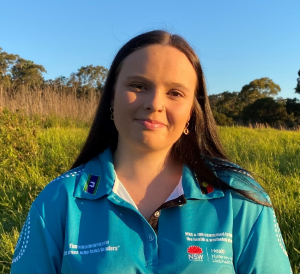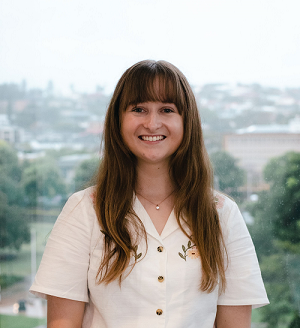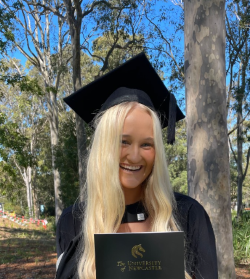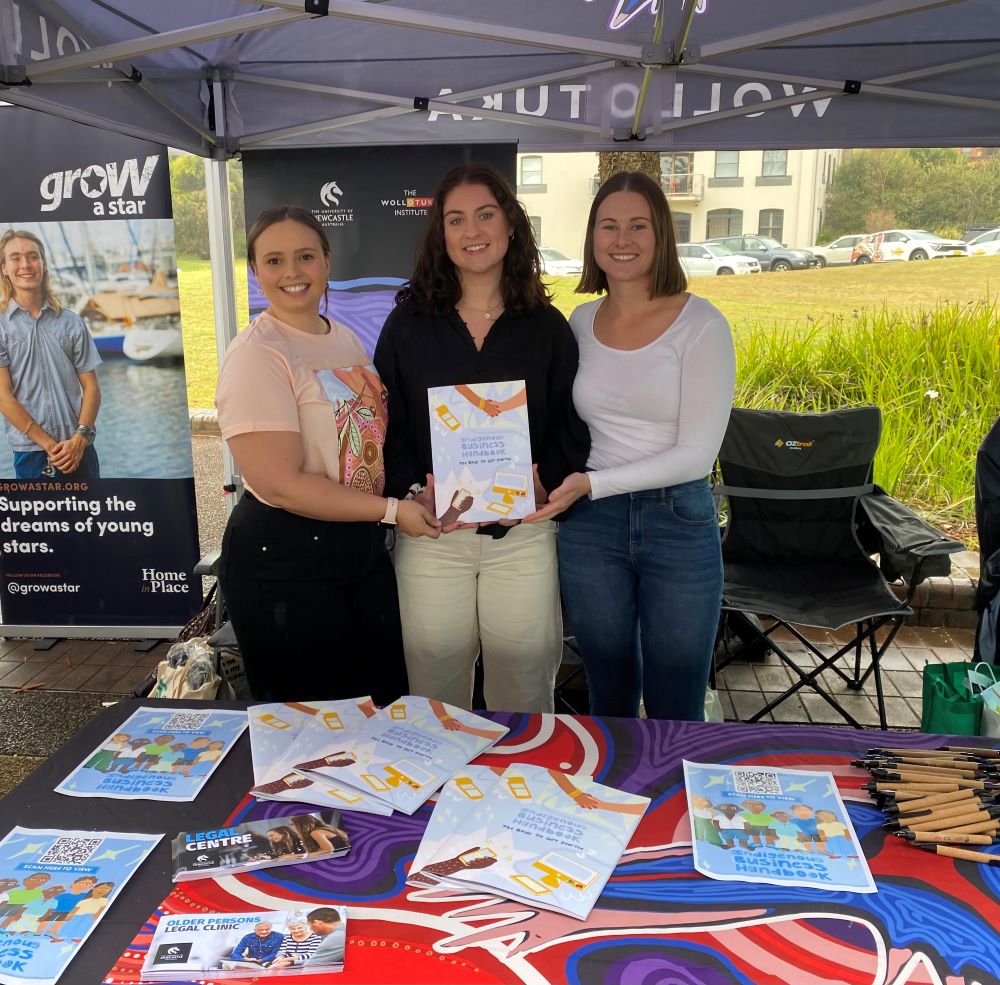Social justice student projects
The Centre for Law and Social Justice supports social justice student projects through directed course offerings. These are LAWS6043 Advanced Legal Research Project and LAWS6091 Special Interest Topic. Students are eligible to enrol in these courses after completing their core courses, the courses run in both semesters. To enrol, students must arrange supervision from a staff member as these courses involve supervised project work rather than a traditional course work schedule. Click below to see our student researchers. Please note, resources do not serve as or in place of specialised legal advice.
Student researchers

Sophie Amanatides
The first iteration and launch of the Indigenous Business Handbook in July 2023 was facilitated by Tori Gill, Kyiesha Faulkner and Sophie Amanatides, the handbook can be found here.

Ms Lucy Burt
Lucy Burt completed the Special Interest Topic Course (LAWS6091), researching the gaps that exist in international policy to address the loss and damage of lived experiences of Pacific Island nations and communities in the face of climate change. This report was prepared in partnership with the Secretariat of the Pacific Regional Environment Programme (SPREP). The full report 'Loss and Damage: Identifying the funding gap' can be accessed here.

Ms Arielle Cirillo
Arielle Cirillo is currently researching compensation owed to Afghan victims of Australian War Crimes. This research brought together an group of experts, the recording can be found here.

Ms Claire Dudgeon
Claire Dudgeon completed a summer role as a research assistant at the Centre for Law and Social Justice engaging with various research projects and tasks.

Ms Elizabeth Duffy
Research project title, 'Social Justice - The University of Newcastle School of Law and Justice.' The concept of social justice is intrinsic to the mission of the University of Newcastle School of Law and Justice. However, social justice can be hard to conceptualise. This research explores conceptualisations of social justice and how it operates within law and other disciplines to better understand the ways in which the School of Law and Justice is implementing these concepts.

Ms Kyiesha Faulkner
The first iteration and launch of the Indigenous Business Handbook in July 2023 was facilitated by Tori Gill, Kyiesha Faulkner and Sophie Amanatides, the handbook can be found here.

Ms Victoria Gill
As part of a multi-year project, Tori undertook research in consultation with colleagues, community and stakeholders to create a Handbook for Indigenous business owners. This Handbook is designed to support small business owners, providing useable legal tools with the recognition of Culture first. In it's inception in 2019, Taylah Gray and Hannah Stenstrom provided essential and foundational work as research assistants with the guidance of Associate Professor Kevin Sobel-Read. Over the years, many students have contributed to the Handbook within the Special Interest Project Course, LAWS6091. The first iteration and launch of the Indigenous Business Handbook in July 2023 was facilitated by Tori Gill, Kyiesha Faulkner and Sophie Amanatides, the handbook can be found here.

Mr Alex Graham
Alex Graham completed the Special Interest Topic Course (LAWS6091), researching the gaps that exist in international policy to address the loss and damage of lived experiences of Pacific Island nations and communities in the face of climate change. This report was prepared from the Centre for Law and Social Justice in partnership with the Secretariat of the Pacific Regional Environment Programme (SPREP). The full report 'Loss and Damage: Identifying the funding gap' can be accessed here.

Mr Kevin Hill
Kevin Hill took the initiative to secure a collaboration with Jubilee Australia for his LAWS6091 special interest topic. His research paper titled, 'Black Sand Mining in the Pacific: Tentative Listing to World Heritage Listing & National Heritage Law Protection' focuses on advocating for economic justice in Asia-Pacific communities and ensuring accountability from Australian corporations and government bodies operating in these areas. This work is currently under review by multiple embassies, an achievement Kevin is especially proud of, considering his Fijian heritage.

Mr Ned Hoswell

Ms Madeline Howle
Madeline Howle completed the Special Interest Topic Course (LAWS6091), researching the gaps that exist in international policy to address the loss and damage of lived experiences of Pacific Island nations and communities in the face of climate change. This report was prepared in partnership with the Secretariat of the Pacific Regional Environment Programme (SPREP). The full report 'Loss and Damage: Identifying the funding gap' can be accessed here.

Ms Zoe Linnane
Research project title, 'International Human Rights in a Comparative Context, Focusing on the Human Rights Frameworks in Australia and New Zealand.'

Mr Jacob Switzer
Jacob Switzer completed a summer role as a research assistant at the Centre for Law and Social Justice engaging with various research projects and tasks. He presented a paper titled, 'From Paper to the Screen: Innovations in Law Libraries and increasing Access to Legal Resources' at the Justice Innovation Symposium. The paper reflected on the challenges experienced by law libraries during the pandemic and how it responded to the needs of the legal profession, scholars and students. It also examined the digitisiation of knowledge and risks associated with the digital landscape.

Ms Amelia Young
Amelia Young completed a summer role as a research assistant at the Centre for Law and Social Justice engaging with various research projects and tasks, including conducting literature reviews. The research area focused on coercive control laws in Australia.

Ms Sunny Zuo
Research project title, 'Gift or Loan.' The aim of this project is to examine the distinction between loans and gifts when money is distributed to family members within an inner circle.
Highlighted Student Projects
Point of sale credit is an umbrella term used to describe one of the emerging financial services on offer, ‘buy now, pay later’ (BNPL) products. Buy now, pay later is a way of purchasing something without having to pay the full cost at the time of purchase, instead making smaller payments over a longer period of time, like an instalment plan. There is no interest payable on the repayments like a typical loan, but there are fees involved. It is important to understand all aspects of the BNPL service industry, as this is imperative in deciding whether the service is appropriate to the individual and their personal financial needs and wants. The services are extremely convenient and can be very helpful and appropriate for many individuals, however with this comes with potentially detrimental consequences, should an individual use the services incorrectly, by the unintentional accumulation of BNPL payments that are unable to be serviced or other debt accumulated. There is a responsibility imposed on the user to understand not only the complex terms but also the and potential risk they are signing up for.
Click here for information sheet.
Read the full article here.
Student: Sophie Amanatides


This report was prepared by Career-ready placement students Madeline Howle, Lucy Burt and Alex Graham from the University of Newcastle's Centre for Law and Social Justice in partnership with the Secretariat of the Pacific Regional Environment Programme (SPREP).
The final report titled 'Loss and Damage: Identifying the funding gap,' aims to highlight the gaps in international policy in addressing the loss and damage of lived experiences of Pacific Island Nations and communities in the face of climate change. The report focuses on gaps in translating concepts of non-economic loss into concrete recommendations. It also provides an outline of the UNFCC Funding Mechanism to demonstrate where loss and damage are not adequately addressed. The full report can be accessed here.
In addition to producing the report, students had the opportunity to present their research in high level meetings, as Pacific Island states prepared for their participation in the COP27 meeting under the International Climate Governance Regime. Further, Madeline Howle and Lucy Burt had the opportunity to celebrate at the Wontok Pasifika event, which highlights the University's extensive Pacific engagement. At the event, Lucy Burt gave an oral presentation to members of the University's Pasifik community and dignitaries.
Australia has seen a drastic growth in online gambling, with approximately 55% of all gambling being conducted online. Whilst credit cards are not the most common method of payment for online/interactive gambling, and is now prohibited, problem gamblers are four times more likely to utilise credit to gamble than those non-problem or low risk gamblers. This intensifies the likelihood and risk of substantial harm. The Interactive Gambling Act 2001 (Cth) prohibits the supply and advertising of ‘designated interactive gambling services’, namely prohibited interactive gambling services, or unlicensed regulated interactive gambling service, to consumers physically located within Australia. At present, the onus is on consumers to protect themselves. This proves difficult for problem gamblers, who are more likely to be using credit to fund their addiction and are predisposed to having lower impulse control. It is recommended that Australia adopts consistent policies with respect to the use of credit for in-venue and online gambling, similar to that of the UK.
Click here for information sheet.
Read the full article here.
Student: Lindsay Thomson


The Indigenous Business Handbook has been written, designed and researched by several thoughtful, talented and dedicated groups of Indigenous and non-Indigenous students at the School of Law and Justice at the University of Newcastle (Australia).This Handbook acknowledges the common struggles, and uncertainty faced, when starting a business; alongside the complex family and social pressures that business owners may encounter. The Handbook aims to provide useable legal tools informed by the recognition of Culture.
The Handbook was envisioned by Associate Professor Kevin Sobel-Read who also supervises the Project. Two remarkable students – Taylah Gray and Hannah Stenstrom – provided essential and foundational work as research assistants. The students listed within the Handbook contributed to the consultation, research and writing within the Special Interest Project Course, LAWS6091. The first iteration and launch of the Indigenous Business Handbook in July 2023 was facilitated by Kyiesha Faulkner, Sophie Amanatides and Victoria Gill. the full handbook can be accessed here.
As a living document, we encourage you to provide feedback and suggestions to inform further iterations of the Indigenous Business Handbook. Please contact Associate Professor Kevin Sobel-Read, Deputy Head of School, Director of Teaching and Learning, University of Newcastle School of Law and Justice
There are a number of accepted ways in which consumers may protect themselves from investment scams. The most notable, as highlighted by Moneysmart and Scamwatch, include:
- Getting professional advice before deciding to invest into an opportunity, including in relation to cryptocurrency. Although there are currently no obligations surrounding the provision of advice in relation to cryptocurrency investments, financial advice should nevertheless be sought from someone who is registered with ASIC, and who holds an Australian Financial Services Licence. This information can be verified on the ASIC Connect Professionals Registers.
- Asking questions and requesting information in relation to investment opportunity. Moneysmart has suggested asking the following questions in order to determine the legitimacy of the opportunity: (1) what is your name and what company do you represent? (2) who owns your company? (3) does your company have an Australian Financial licence and what is the licence requirement (although not required for cryptocurrency investments) (4) and what is your address?
- Researching the company or person offering you an investment opportunity. Information given by the company or person offering the investment opportunity should never be taken on face-value, and should be verified using available, independent sources.
- Checking if the scam has already been posted to consumer protection websites like Scamwatch.
Student: Levi Grondin

In March 2022, there was $33.28B in new borrower-accepted loan commitments for residential housing (seasonally adjusted), of which $21.57B was accounted by owner occupiers, and $11.71B by investors. Further, $2.29B was accounted by personal fixed term loans and $9.13B accounted for business loans (construction and property purchase). Australia’s household debt-to-income ratio is currently in the top quartile of the world. No matter how a decision is made regarding the credit extending to an applicant (i.e. whether to give credit, and if so, the terms on which it is provided), a voluminous amount of data and information is used by the potential lender. In terms of the information that is used, the credit score of an applicant has been the dominant piece of information used when assessing the “five C’s” that the lender will consider. However, the Office of the Comptroller of the Currency (OCC), part of the US Department of Treasury, has questioned the traditional dominance of the credit score. The OCC has noted that people who lack a credit score struggle to obtain credit, but that they are paying rent, utilities and financial obligation on time. These on-time payments could be used as an alternative to the traditional credit score. The OCC noted that there are 45-65 million people in the US with “either no credit file or a very thin credit file,” most of which are minorities. This is a point worth considering, especially the impacts of artificial intelligence in the lending decision.
Read the full article here.
Student: Nathan Hawkins

In recent years the reports of fraud, identity theft and other scams have soared. Scammers study their potential targets and there is little doubt that scammers target unsuspecting and sometimes vulnerable groups. Romance scams occur in situations where an individual is deceived for financial gain by someone whom the victim perceives to be in a relationship with them. The increase in internet use, the growth in loneliness and the increasing engagement in online dating sites during COVID-19 presented opportunities for romance scams to increase. One UK study by Buil-Gil and Zeng (2022) has shown that romance scams are a growing crime, which not only increased drastically during COVID restrictions but had been growing each year for at least seven years.
Resources
Students: Talia Nardi, Olivia Shedden, Jessica Horne, Hanna Silva Cunha




This project aims to examine the distinction between loans and gifts when money is distributed to family members within an inner circle. In the absence of clear documentation or formal agreements the court will rely on various factors to determine the intention behind the transactions. These factors include; the relationship between the parties, the context in which money was given, and any evidence of discussions regarding repayments.
Click here for information sheet.
Read the full article here.
Student: Sunny Zuo

International Human Rights Law
The artworks represented in this presentation were selected by students in the course International Human Rights Law at the University of Newcastle School of Law and Justice, Australia, in 2023. Students identified artworks that connected with themes in human rights law and, by reflecting on these artworks, discovered powerful connections between artistic expression and human rights principles.
International Human Rights Law 6:35
The University of Newcastle acknowledges the traditional custodians of the lands within our footprint areas: Awabakal, Darkinjung, Biripai, Worimi, Wonnarua, and Eora Nations. We also pay respect to the wisdom of our Elders past and present.